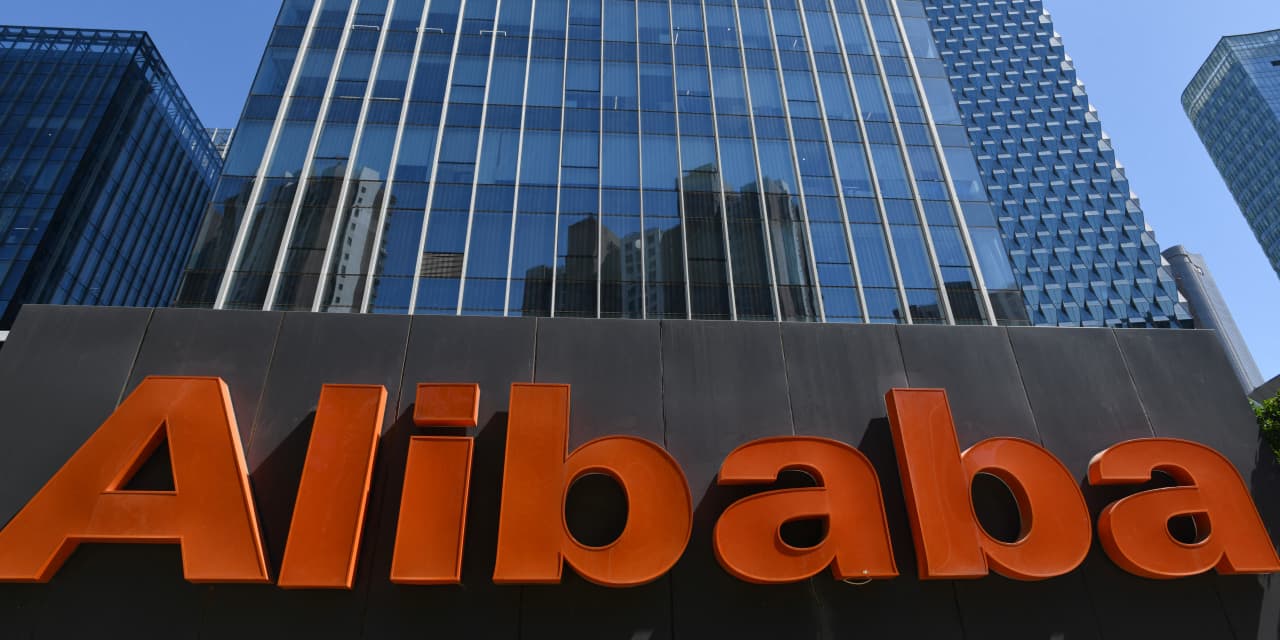Alibaba
stock dropped on Wednesdayas investors focused on the bad news in the latest earnings. The economic slowdown in China continued to weigh on the e-commerce,and cloud-computing company as competitive threats loom. Even a big boost to share buyback plans doesn’t seem to be soothing investors.
U.S.-listed shares in Alibaba fell 5.9% to $73.64 on Wednesday after the company posted results that fell short of Wall Street’s expectations. Alibaba reported earnings of 2.37 Chinese yuan (33 cents) a share on revenue of 260.3 billion yuan ($36.6 billion) in the December quarter, while analysts surveyed by FactSet had forecast earnings of 2.39 yuan a share from revenue of 260.7 billion yuan.
Earnings per share fell 2% year over year while revenue rose 5%, a far cry from Alibaba’s days of double-digit growth. But that’s no surprise—the slowdown that has hit the world’s second-largest economy over the past year has weakened the consumers at the heart of Alibaba’s business. Tensions between the U.S. and China over high-tech chips have also challenged the company’s once fast-growing cloud-computing and artificial intelligence arm, derailing plans to spin off the division.
All this is to say that among Alibaba investors, who have weathered a 75% drawdown in the stock price since late 2020, expectations were not high. Alibaba tried to cheer them Wednesday with a move to expand its share-buyback program by $25 billion.
The company repurchased $2.9 billion of stock in the last quarter and now has $35.3 billion set aside for buybacks over the next three fiscal years. That is almost 20% of the company’s current market capitalization.
“We increased our investment in strategic priorities and improved shareholder return by leveraging our strong balance sheet and cash flow … demonstrating our confidence in the outlook of our business,” Alibaba’s chief financial officer, Toby Xu, said in a statement. “Our consistent share repurchase has also reduced outstanding share count while achieving earnings per share and cash flow per share accretion.”
That didn’t seem to win over those who invest in China, where stocks have endured brutal selling in recent weeks amid concerns over the Chinese economy and stresses from its sprawling and indebted property sector. China’s stock-market slide is even directly reflected in Alibaba’s earnings; the company reported net income was down 77% year over year, which it said was primarily attributable to mark-to-market changes on the value of equity investments.
There is plenty more to be gloomy about. Revenue at Taobao and Tmall, the two platforms that make up the core Chinese online retail business, rose just 2% year over year. That is an ill omen on the macroeconomic front for those watching Alibaba’s results as a bellwether for consumption.
The anemic growth in Chinese e-commerce may also reflect increased competition from
PDD,
which owns rival Pinduoduo and the U.S. platform Temu. PDD is a more budget-friendly platform than Alibaba and recently eclipsed the company in market value, a shift reflecting the stresses on Chinese consumers. Shares in
JD.com,
another Alibaba rival that could also feel the pinch from PDD, fell 4.2% in early trading. PDD stock was up 0.7%.
“Our top priority is to reignite the growth of our core businesses, e-commerce and cloud computing,” said Eddie Wu, Alibaba’s CEO, in a statement. “We will step up investment to improve users’ core experiences to drive growth in Taobao and Tmall Group and strengthen market leadership in the coming year.”
The latter point—strengthening market leadership—seems directly targeted at PDD. But, more broadly, the problem for Alibaba is that reigniting the growth of its core businesses is largely outside of the company’s control. Management discussed improving users’ experience on a conference call with analysts, but the fact remains that e-commerce will be under pressure while China’s economy remains weak. Alibaba’s cloud and AI arm, meanwhile, faces headwinds from chip supply. Regulatory risks also continue to loom.
The stock market knows this, which is why Alibaba stock is so beaten-down. It appears to be a screaming buy in terms of value-investing metrics, but in reality it is a value trap that has lasted years for investors. The fact that not even a $25 billion share buyback was enough to lift the mood tells you all you need to know.
Write to Jack Denton at [email protected]
Read the full article here










